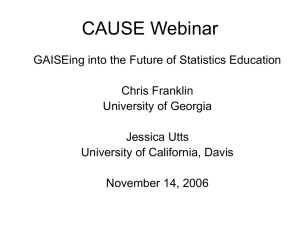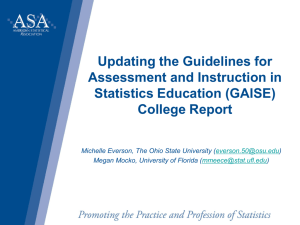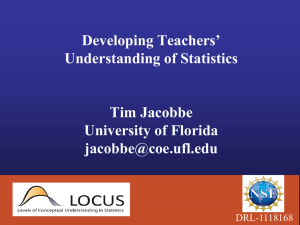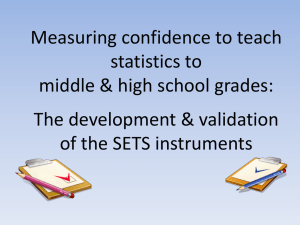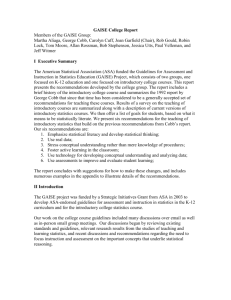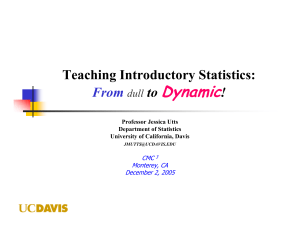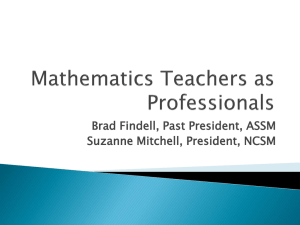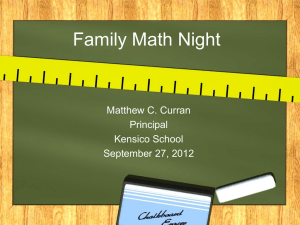MATH 598_Day 1 PPT
advertisement
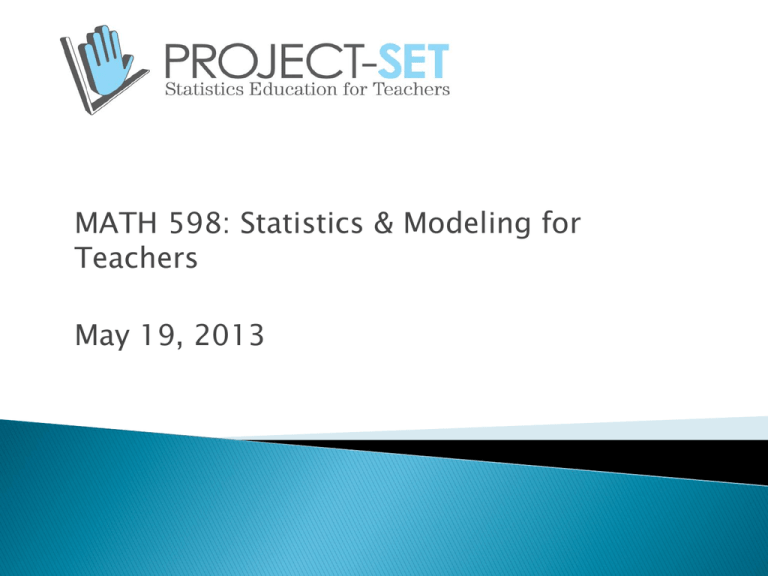
MATH 598: Statistics & Modeling for Teachers May 19, 2013 Name Activity Music Activity Padlet Activity Review Course Syllabus Common Core Activities GAISE Pre-Assessments ◦ Statistics Content Standards ◦ Mathematical Practices ◦ Common Core and GAISE Parallels activity ◦ CREP Survey ◦ LOCUS Test Use your laptop to access the following URL: http://padlet.com/wall/uwnqlpug04x0 Post a response to the following questions: What is statistics? How does statistics differ from mathematics? Your posts are anonymous. We will not know who said what. Activity 1: Each of you has a set of the Statistics Standards for Grades 6-12. Your task is to group the standards by the grade level you think they represent (either MIDDLE SCHOOL or HIGH SCHOOL) Discussion: Compare your placements with those of other people and with the Standards presented on the handout. How close were you? What is your overall impression of the Common Core Statistics standards? What surprised you? What do these standards mean for teachers in schools? In other words, how, if at all, will this change mathematics curriculum/teaching/learning? Activity 2: Review your assigned Mathematical Practice(s). Read both the original text and the summary. Develop examples of when/how students would demonstrate these practices in the context of learning statistics. Where might we see these practices in a Statistics class? Be specific. The Difference between Statistics and Mathematics “Statistics is a methodological discipline. It exists not for itself, but rather to offer to other fields of study a coherent set of ideas and tools for dealing with data. The need for such a discipline arises from the omnipresence of variability.” (Moore and Cobb, 1997) A major objective of statistics education is to help students develop statistical thinking. Statistical thinking, in large part, must deal with this omnipresence of variability; statistical problem solving and decision making depend on understanding, explaining, and quantifying the variability in the data. It is this focus on variability in data that sets apart statistics from mathematics. GAISE Report, p. 6 Statistical problem solving is an investigative process that involves four components: I. Formulate Questions ◦ Clarify the problem at hand ◦ Formulate one (or more) questions that can be answered with data 2. Collect Data ◦ Design a plan to collect appropriate data ◦ Employ the plan to collect the data 3. Analyze Data ◦ Select appropriate graphical and numerical methods ◦ Use these methods to analyze data 4. Interpret Results ◦ Interpret the analysis ◦ Relate the interpretation to the original question Look over the levels outlined in the GAISE Framework: What Level was the Name Activity that we completed at the start of class? Why? What additional questions/extensions could you add to the Name Activity (if any) to move it to the next Level of the GAISE Framework? Look over the levels outlined in the GAISE Framework: What Level was the Music Activity that we completed at the start of class? Why? What additional questions/extensions could you add to the Music Activity (if any) to move it to the next Level of the GAISE Framework? Discuss the following questions with a partner: ◦ Does the GAISE framework fit with the CCSSM? If yes, how? If not, how do they differ? ◦ What is your overall impression of the GAISE framework? ◦ What surprised you? ◦ What does this framework mean for teachers in schools? How, if at all, will the GAISE framework change mathematics curriculum/teaching/learning? Activity 3: You each have a copy of the level B and level C GAISE guidelines as well as a set of the Common Core 6-12 statistics standards. Your task is to determine the overlap of the Common Core high school standards and the GAISE guidelines. You might do this by placing the CCSSM standards on the GAISE guidelines copies. Then, revisit your answers to the questions: ◦ Does the GAISE framework fit with the CCSSM? If yes, how? If not, how do they differ? Read 6-8 DEU Big Idea 1 Homework 1 Use your laptops to access the following survey: https://www.surveymonkey.com/s/setday1 LOCUS Pre-test Visit: http://dev-artist.gotpantheon.com/ Click on Test Taker Enter Access Code: BVjtsNGwrK Enter Identifier (enter your name)
